|
|
 |
Who is Treated Unfair? -Guatemala Coffee of Today |
2001 - it is unforgettable year for us.
The market price of coffee has been gradually getting higher since it's become a subject of investment fund in recent years. Most of the coffee production country had tried to meet with the market in the introducing production system, but as soon as the fund was disinvested from the market, the "Coffee Crisis" started.
An unprecedented slump had happened in coffee market, and green bean reached the lowest price, 41.50 cts. per pound in New York market (this has broken the record of the cost 45.25 cts at the frost damage happened in Brazil in 1975). In consequense, it demanded the coffee producers much lower price that there would be no cost recovery to collect. Therefore, most of the producers left coffee business, but consumer countries were blessed with the lowest price as they had been impoverished by price rise (of cause there was a number of discontenued retailers by the soring raw material prices).
Today, another surge which was caused by the Coffee Crisis has been attacking the coffee industry. |
| |
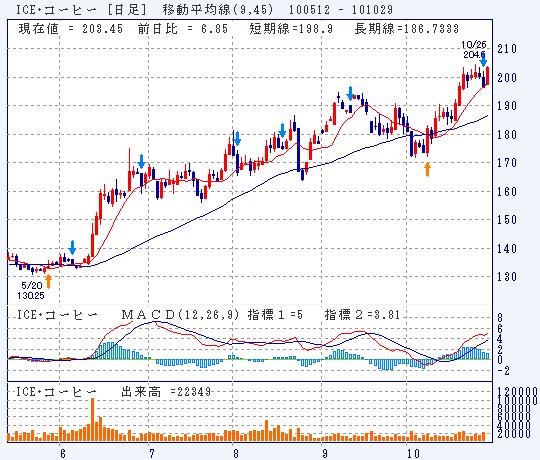
|
| |
| In 2011, futures quotations in New York market has been changing at about twice as high as the New Year's price and kept rising since last 14 years. According to SCAJ, the biggest coffee producing country Brazil had a abundunt harvest in this year, and the total amount of coffee production of the world would be 8.34 million tons, up 9.6% from the previous year. Additionally, according to U.S. Department of Agriculture, that of consuming amount would be 7.86 million tons, down 3.4 % of the previous year. Even though the consuming amount of rising nations have been gradugally increasing, it has less than 20% share of the total amount - the decrease of consuming amount in developed nations has much bigger influence. Generally, the price will decrease if the supply increases and the demand decreases - then why that of coffee has been jumping up? There is only answer: investment fund has been working again. |
 |
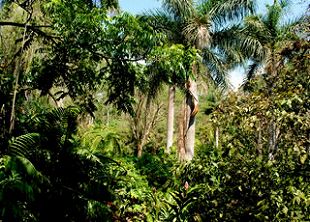
Typical Guatemalan coffee farm |
|
A rise in the market itself would temporarily be good advantage. The coffee producers we have met in Guatemala all looked cheerful.
Guatemala is located in the south of Mexico and the north of Honduras, and it is the second biggest coffee producing country following Mexico.
Guatemala is blessed with rich precipitation and volcanic ash soil, moderate temperature, cool breathe from mountains and warm breathe from gorges, all of which are sufficient conditions for coffee cultivation. Pt.Ceylan is located in southeast of Lake Amatitlan in Villa Canales (a municipality in the GUatemala department), and owned by Dariush Echeverria Zechrisson. It has history of its 100 years, and has kept producing coffee of high quality under the blessing. |
|
| |
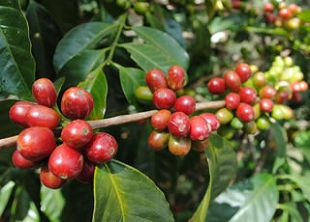
It looks have more coffee harvest than ordinal Geisha.
|
|
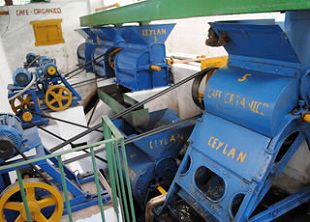
Provided coffee refining machine. |
|
| |
It has an area of 120 ha, and cultivating Bourbon and Geisha (seems different species from the common one).
There is community space (clean lounge, church, and so on) provided for workers in the area. Although it does not seem to be related with the coffee quality, it well reflects the owner's pleasant personality.
Of course, they are environmentally responsible as well - all the coffee plants are grown under shade trees, and they use only wild plants for them to protect the ecosystem. The berrys which are generated in the pulping process are used for producing organic fertilizer with a good use of worm casting, and they use the manure for fertilization again, making a sustainable life-cycle. It is just an ideal model of sustainable management. |
|
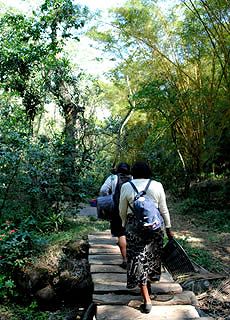
Going through the forest for harvesting. |
|
 |
The anciet capital Antigua is in the central highlands of Guatemala, surrounded by Agua Volcano, Acatenango Volcano, and Fuego Volcano, and the rich soil of volcanic ash contains lots of pumice, which maintains the soil in an even humidity. The bright sunshine in the daytime and cold breathe from the mountains at night make wide diurnal temperature range, which makes hard coffee berrys. Because of such ideal natural conditions for producing specialty coffee and its longest history of coffee cultivation in Guatemala, Antigua is synonimous with the highest quality coffee. |
| |
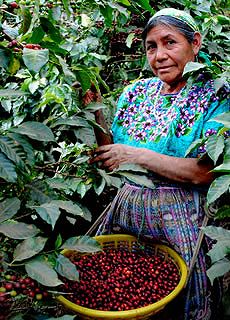
Their traditional dress well stands out in the farm. The pattern is decided depending on the village, and it clarifies one's home village. |
|
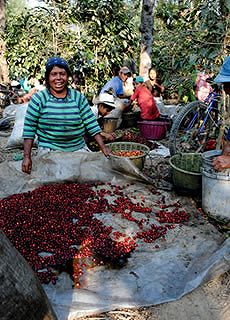
The process of sorting before harvesting is an important key which gives a great influence on coffee quality. |
|
Urias farm began in 1871. The third owner Mr. Hector sticks to his principle that is to harvest only fully ripened berrys, and we have a long-term relationship with them. The full body, rich flavor, and clear acidity of the coffee which the terroir produces have been fascinating a lot of coffee lovers (and I am the one) |
|
| |
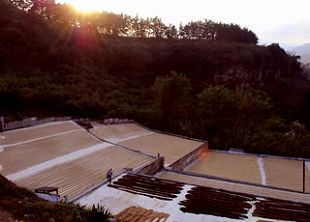
Dusk at the mountain village. |
|
Although it was the end of harvest time at which the farm would be lively the most with a lot of coffee pickers when we had visited there, something was unusual and some trees were dead before the cherrys riped.
I heard that they had a record rainfall which made the trees dead, and the harvest amount would decrease to 700-800 bags (60kg/bag), which is half of the annual average. |
|
| |
Even though there is only a few things that we can do for help them, my principle is to "try whatever I can do". Thinking what I could do for supporting as another subject, I left the farm. |
|
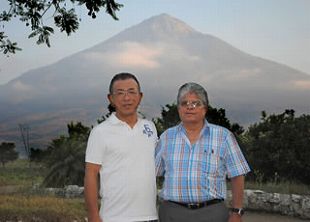
With Mt. Agua in the back. It is called the second most beautiful volcano in the world. The top is needless to say... |
|
 |
We can guess the reason for the sudden rise in coffee price from two respects. One is that each price of most primary products (crude oil, wheat, soybean, suger, rubber and etc.) has been soring as well.
The other is that it has started as soon as the U.S. operated additional monetary relaxation in which 600 billion dollars was injected into the market. The operation itself should not necessarily be blamed because it was taken as a measure for economic recovery after Lehman Shock. However, it saved not only the economy but also investment fund as side effect.
If Fairtrade stands for greater equity and better conditions in international trade, is it "Unfairtrade" that we are operating now?
Indeed, soring prices brings producers a temporal advantage. However, consumers' demand then begins to shift away from coffee, and eventually those producers of primary products have to pay for the bill. Much less, some farms like Urias have been suffering from the aftermath of disasters.
|
| |
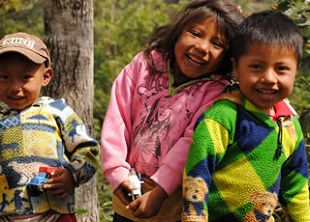
For kids, coffee farm is the best playground as well as their parents' work place. |
|
Rising prices in primary products threaten lives of people in entire world as well as those in low-income group, so we have to take another measure in order to avoid fund injection itself.
At G20 (the Group of Twenty Finance Ministers and Central Bank Governors) in 2011, there was a discussion how they would impose control on speculative fund into the market. While France asserted strengthening of the regulation, the U.S. adopted a very careful consideration on the issue. They would not reflects the damage they have had afer Lehman Shock.
In the U.S., there is a firm interrelationship between the political world, financial world and institution, and it is quite hard to put a control on capital movement. (Rather, Japan may well be blamed more since they did not even give any statement about the regulation.) |
|
|
| |
Although there is nothing we can do for the control on investment fund, that is our obligation to protect coffee industory. Coffee price is to bring fair benefits to all of those who are involved.
Even if there is a fear of sudden fall in coffee price as we see the case of the Coffee Crisis in 2001, I'd like to start with what we can do so that there would be stronger connection between producers and consumers, rather than concerning with another coffee crisis. |
Mitsuhiro Yamamoto
HIRO COFFEE Representitive Director |
|